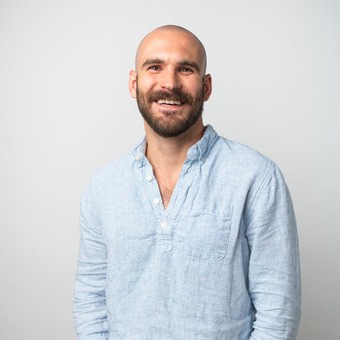 Ask any digital marketing consultant and they’ll tell you that organic media alone does not make a cohesive online marketing strategy. Trust us — we’ve asked.
Ask any digital marketing consultant and they’ll tell you that organic media alone does not make a cohesive online marketing strategy. Trust us — we’ve asked.
Thankfully, Zac Young isn’t just any digital marketing consultant. As the associate media director at IMM, a solutions-focused marketing agency that believes in the power of data to drive business decision making, Zac is the ideal expert to answer our top questions about paid media, internet marketing and the future of online advertising.
When it comes to online marketing, how would you explain the value of paid media to a skeptical decision maker?
Ads work — it’s just that simple.
Here’s a quick case study that proves it: In 1938, New York ad agency, N.W. Ayer partnered with De Beers Consolidated Mines (known these days as De Beers) to help assist with the falling prices of diamonds across the world. Ayers’ ingenious idea was to bring the notion of diamonds as a romantic symbol of indestructible love into the mainstream.
Over the next decade or so, they deployed this message across a variety of different channels and methodologies, but my personal favorite strategy found Ayers sending speakers to high schools across the country to deliver lectures about diamond engagement rings. Their efforts were so successful in the U.S. that De Beers aggressively marketed a similar concept in Japan during the mid-1960s, and again more recently in the 1960s in China.
Ultimately, the results were staggering — De Beers wholesale diamonds grew from $23 million to $2.1 billion from 1930 to 1979 while their ad budget soared from $200K to $10 million per year. Of course, that isn’t to say that all advertisements work. De Beers tried similar initiatives in Brazil and had a hard time disrupting its cultural norm of wearing a simple band on the right hand while engaged and then switching to the left upon getting married.
Ads can — and do — work. But that’s not the entire story. They must be done correctly and with consideration for your company, competition, collective and culture. Digital marketing consultants call these the 4 C’s — not to be confused with the 4 C’s of the diamond industry! — and understanding them is key to getting the most value out of your advertising strategy.
A smart advertising strategy can create demand for just about anything, diamonds included.

Since we talked about the growth of De Beers’ ad budget over the years let’s go a step further and talk about the value of consistency in paid media. Nielsen studies show it takes 2 to 3 years to recover equity lost from halted advertising. And that long term revenue takes a 2 percent hit for every quarter a brand stops advertising. There are also indications that consistency is hugely important during economic downturns such as recessions and depressions.

How has the internet marketing landscape evolved in the wake of the pandemic?
The media landscape has had a fascinating evolution during COVID-19. Let’s talk about the biggest shift in my favorite area, Online Video and Connected TV. Streaming consumption is up more than 74 percent from last year.
While this was already on a growth trajectory, the pandemic has sped up that process, and consumption levels have remained elevated ever since, which indicates these changes are likely the new normal. More than half of that year-over-year growth (57 percent) occurred outside of Netflix, Hulu, Amazon, Disney+ and YouTube. Additionally, we’re actually seeing living room streaming take share from bedroom streaming, which indicates better opportunities to reach more individuals in the household at once.
What online marketing trends do you anticipate in 2021?
Expect to see an increased focus on privacy and legislation around data. The biggest variable I see here is that the people responsible for the legislation surrounding digital advertising simply do not understand the ecosystem. Think about the Zuckerberg hearings — it was painfully apparent that the people in charge of writing the laws need more information around data and digital media to make more informed decisions.
What missed internet marketing opportunities do you see most frequently with clients?
I cannot tell you how often I tell folks that spending the majority of their budget on retargeting people who have been to their site is not the best strategy. Retargeting certainly matters, but growth also comes from investing in bringing new people into the brand.
Thinking about bottom line growth — as opposed to just the easiest returns — is the best way to build your brand for the future. Investing in people who were going to buy your product regardless of ads will look great from an attributable Return on Ad Spend (ROAS) perspective, but it won’t be as beneficial to your bottom line as focusing on investing in incremental sales where you actively help customers choose your brand.
What do people most misunderstand about paid media?
In my experience, the majority of conversation around paid media is how the average consumer finds ads annoying and doesn’t believe they work. But here’s the thing — ads are valuable to consumers, too. It’s accessible (read: free or affordable) content and entertainment.
Think about it like this: Would you pay $9.99 per month for Instagram? Even if you could, do you think your entire network on social media could afford it? Now, let’s assume you have to start paying per search fees for Google. Would you pay $0.10 for every Google Search and $0.50 for every use of Google Maps?
Take a look through your phone and think about how much content you would lose access to if you had to start paying for everything with out of pocket costs instead of your attention. To me, the attention economy puts us on the path of making access to information more universal. Certainly there are still a ton hurdles to tackle before that dream becomes a reality, but I believe we can get there. Of course, that’s the topic of an entirely different blog post for another day.
What questions should we be asking about online marketing?
How do we steer the ship away from walled gardens and tackle the issues of fraud and bad players trying to game the system? And how can we ensure that future legislation is informed and not biased? Not easy questions but the answers are well worth seeking out, particularly for those of us within the digital marketing analytics services ecosystem.
Still weighing the pros and cons of paid versus organic strategy? Find out what CSG’s chief innovation officer has to say about digital strategy in the days ahead and beyond.
—
Citations:
https://www.nielsen.com/us/en/insights/article/2020/as-ad-spending-picks-up-brands-need-to-balance-awareness-and-activation-strategies/
https://www.nielsen.com/us/en/insights/article/2020/connected-tv-usage-remains-above-pre-covid-19-levels-as-traditional-tv-viewing-normalizes/
https://www.nielsen.com/us/en/insights/article/2020/growth-spurt-time-spent-streaming-ad-supported-video-is-outpacing-big-name-svod-viewing/
https://www.abacademies.org/articles/a-study-on-the-influences-of-advertisement-on-consumer-buying-behavior-7177.html#:~:text=Advertising%20promote%20social%20messages%20and,the%20minds%20of%20the%20consumers.
https://journals.sagepub.com/doi/full/10.1177/0973258618822624
https://www.researchgate.net/publication/331093806_Impact_of_Media_Advertisements_on_Consumer_Behaviour
https://amp.theatlantic.com/amp/article/385376


